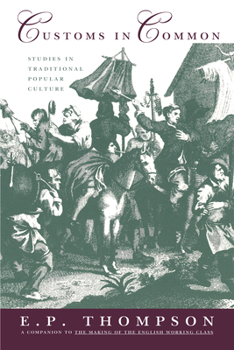Customs in Common: Studies in Traditional Popular Culture
Select Format
Select Condition 
Book Overview
The "meticulously researched, elegantly argued and deeply humane" sequel to the landmark volume of social history, The Making of the English Working Class (The New York Times Book Review). This remarkable study investigates the gradual disappearance of a range of cultural customs against the backdrop of the great upheavals of the eighteenth century. As villagers were subjected to a legal system increasingly hostile to...
Format:Paperback
Language:English
ISBN:1565840747
ISBN13:9781565840744
Release Date:August 1993
Publisher:New Press
Length:560 Pages
Weight:1.52 lbs.
Dimensions:1.2" x 5.5" x 8.3"
Customer Reviews
1 rating
Great social analysis of XVIIIth century England!
Published by Thriftbooks.com User , 18 years ago
E. P. Thompson was one of the founders of social history. He was part of a group of marxist British historians, among them were Raymond Williams and Eric Hobsbawm. Costums in Common offers a great social analysis of XVIIIth century England. His main thesis is that XVIIIth century England saw sort of a tacit agreement of social behavior and stability between the gentry and the poor. They were both allowed to take certain measures to achieve their aims--the gentry did it via the parliament, and the poor via civil desobedience. Most interestingly, however, was the symbolic struggle, or cultural struggle--what E. P. Thompson calls the theatre and counter-theatre. The theatre meant the social attitudes--the gentry had its wigs, its fancy outfits, and its arrogant attitude, and the poor had its popular culture. This was a way to channel power and discontent through cultural manifestations. All in all, E. P. thompson demonstates how all these tacit agreements and symbolic struggles allowed England to go through the XVIIIth century without going through a revolution (unlike the rest of Europe did or would later), although let's not forget that this was the rural poor and the haute bourgoisie and aristocracy, but the real bourgois were barely emerging. For that we'll have to turn to his other (and lenghtier too) book: The Making of the English Working-Class.





